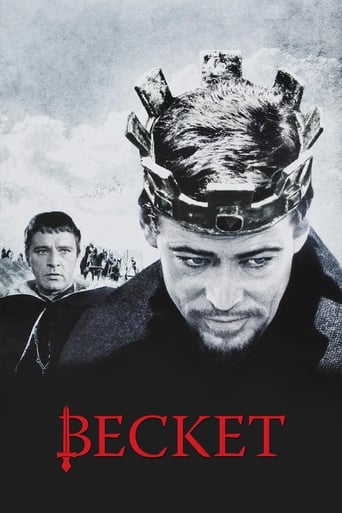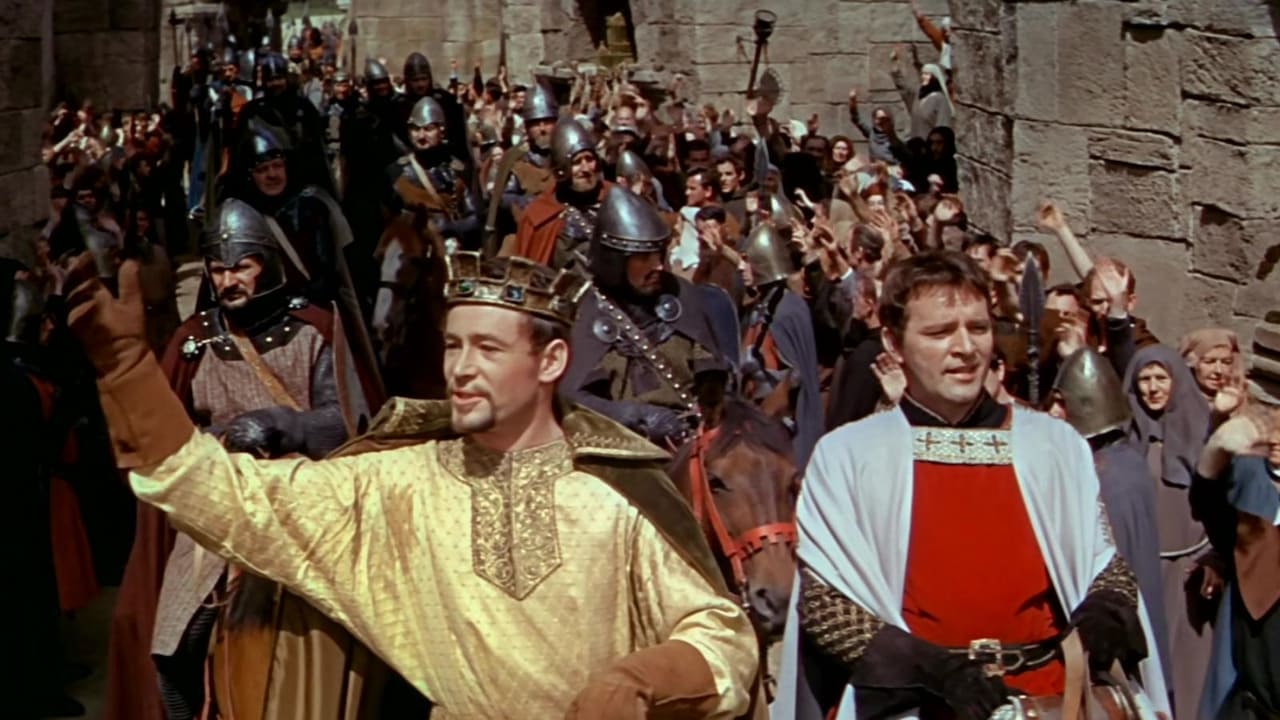HotToastyRag
Becket is a man's movie. I don't think there are any women in the cast, or if there are, they have very insignificant parts. My brother, who has been known to tolerate rather than enjoy old movies, loved this movie. Whenever he talks about the classic film genre, he says, "You know what movie I liked? Becket!" The only bad part of the movie is what happened during the 1965 awards season. Richard Burton and Peter O'Toole were repeatedly pitted against each other in the Best Actor category. If only tied awards were more prevalent. Both men were nominated for the 1965 Oscar, and Rex Harrison ran away with the gold for his bored, flippant, tired, lousy performance in My Fair Lady. If that doesn't make you lose faith in the Academy, just wait two more years for Richard Burton to once again lose the gold in Who's Afraid of Virginia Woolf? to Paul Scofield in A Man for All Seasons. Just terrible.Anyway, back to Becket. If you like Richard Burton or Peter O'Toole, you need to watch it. Their performances are fantastic beyond description; you could watch it ten times and still come out with a tie as to who gave a better performance. Pete plays King Henry II, and Dick plays Becket. The king and the archbishop differ in their core beliefs, but will religion get in the way of their friendship? Will Becket compromise his morals to stay a loyal friend to the king? The historical friendship between the two real life figures is written out thoughtfully and rivetingly, even though the story was originally based off a play. Yes, it's wordy, but none of the speeches are wasteful or boring. It's incredibly thought-provoking, constantly pulling the audience both ways. Both characters are likable and both sides of the debate are understandable. And since the actors were famous friends offscreen, it's that much more enjoyable to watch them verbally spar with each other on screen. It's a true masterpiece.
cinemajesty
"Becket", Peter Glenville's film interpretation of Jean Anoulih's stage play released spring 1964 lives from his star-vehicle main characters portrayed by Richard Burton and Peter O'Toole, given Henry II of England a face for an anamorphic cinema-scope canvas.Henry II. arrives on Canterbury church sight, the year approximately 1066. The ambiance shows power of the clergy, here monks in brown robes, towards the English Throne. A flashback rolls out, revealing Becket & The King as brothers in crime. They are on rampage tour through the English landscape drunk and excited. The king seduces a peasant girl and steals her virginity. Despite Henry II, Becket loves living and respects life itself. The film unfolds the idea of life through two contradicting actors performing their version of each one's character.Burton and O'Toole are the real treasures of the picture with a oil-paint canvas like cinematography, minimal invasive camera movement and the occasional low-angle work. The ring with the great seal of England is given to Becket by the King, who snappy completes "Don't lose it or we need all move back to the Normandy." Peter O'Toole performs Henry II. as a playboy with will and focus. His character battles the members of the church for money in demanding risen taxes to fight the French. The king gives away a peasent girl in his own right as in-official slave trader to Becket, followed by a major feasting in the castle's main hall with a food & drink overload concluding in maximum vast before Henry II realizes Becket as a deacon at his side.At running time mark 52mins 00sec (PAL version) the King makes Becket the Arch-Bishop of England, leading to a power ascension within his kingdom, pointing out to Becket: "The Dye is cast. Make the most of it", not realizing that he cast off a life-threatening battle between King & Arch-Bishop, which becomes the main theme of "Becket". Richard Burton's character goes through a transformation from the King's friend / servant to head of the clergy. Nevertheless he must confess to been weak and self-indulging by seeking only his own benefit and personal pleasure. When at running time mark 01h 09mins 00sec, Richard Burton performs the prayer for his earthly sins, Peter Glenville's adaptation of "Becket" arrives in full bloom of non-stop conflicting between two powerhouse performers.Peter O'Toole's interpretation of Henry II shows constant temper, charging his power from food & drink infusion. The women pampered and stuck in the castle's chambers are the only ones who dare to distort and controvert the king. Right before the Intermission break at 1h 19min. 00sec., an ominous Lord Gilbert gets ex-communicated by Arch-Bishop Becket, which initiates the twist from friendship to battling each other to the death. Henry II schemes to accuse Becket of treacherous embezzlement regarding the King's savings. In return Becket accuses Henry II to be a Libertine. Becket in fully-charged of pride curses Henry II to become ex-communicated and an outcast.A revenge theme sets in over the battle of institutions. In return Henry II summons Becket to the court of law, declaring Becket an enemy to the crone. Director Peter Glenville handles the pinball game between the main characters with utmost precision with lacking continuously digging deeper into the King's psyche with character punch lines as "I don't like my children" as the King states to his wife. Nevertheless Henry II thanks his mother for given birth to him and correcting his wife of being absent at his physical side in which he learns to rule alone. Richard Burton's character counter-strikes with "I will be judged by the pope alone", in which he declares Total War to the English crone.Under the tightening noose, Becket has no choice accepting the pope's suggestion to do Monastry work, taking the easy way out in a life as monk in almost luxury manner before he is allowed to return to England under amour by the French King Louis VII, ingeniously performed by John Gielgud as a lively gay character. Goeffrey Unsworth plain, stage-like cinematography stays uneventful. All the film's power lies in the hands of the actors Richard Burton & Peter O'Toole, whose on screen chemistry comes to catharsis in an EXT. scene on a beach at Dover's.The quintessence of the King's character evolution takes shape that people kill what they love most, out of fear of losing it or to be touched by it physically as well as spiritually. So Henry II sends his knights to murder drunken Becket on holy grounds at Canterbury. The arch-bishop summons his dying day as Black World, getting dressed with red under-gown covered in white and gold. The servant, who presents Becket with a silver cross before taking the knight's with stab, trying to protect the arch-bishop. Becket on his knees, giving no resistance towards the King's knights. He gets slashed into pieces.Flashing forward to opening sequence, Henry II receives whiplashes by monks to eternity in front of Becket's grave, seeking redemption of a murdering his only friend. Again the cinematography in lighting and camera movement presents itself insufficient to prevail a test of time. The film concludes with Becket declared saint, revealing the the rotten desolated state of the world, but at least it pacifies the mob. The King leaves Canterbury as he came. The end.© 2017 Felix Alexander Dausend
Robert J. Maxwell
It's a sad story of Henry II (O'Toole) and Thomas Becket (Burton) who begin as friends and end as enemies. No one likes to see a friendship die, let alone the Archbishop of Canterbury.The performances -- it's hard to imagine how they could be topped. O'Toole is a king, ruthless in his pursuit of power and sex. And sometimes he lapses into childishness and seeks reassurance in Becket's bed, with no homosexuality implied. Protocol is observed though. The king calls his friend "Thomas," while his friend calls the king "My prince." No doubt about who's superior to whom around here., Burton begins as his reticent knight and valet, more sensible, as if he actually had frontal lobes, and more austere. It's made clear that he is a Saxon, while O'Toole's king is a French Norman, and that Burton takes care of the king properly. But there is a void in Burton because he seems to lack passionate conviction. He doesn't seem to believe in anything. He takes care of whatever business is at hand. And when he's promoted to Chancellor of the Exchequer or Minister of Finance or Order of the Steam Bath or whatever it is, he turns his attention to managing the king's everyday financial affairs as well as giving him advice.The king is a Norman and the chancellor is a conquered Saxon, and thus natural enemies. This is only one hundred years after the Battle of Hastings when William the Conqueror invaded England and squashed the Saxons mercilessly. The French were the nobility and the Saxons were the churls in the barnyard, which is why a pig is a swine in the stye but becomes pork when it reaches the table.So O'Toole has his doubts about Becket, but he nevertheless trusts him enough to appoint him Archbishop of Canterbury so that he will put an end to the braying of the church, a rival for the king's power. It's a big mistake for O'Toole. Suddenly the void within Becket is filled; he has an epiphany and becomes a true religious and an obstacle to the king. That was a mistake for Burton, one he doesn't survive. The first problem arises when Burton, now Archbishop, is informed that a priest has been accused of "debaucherie" and is about to be dragged before a civil court instead of being tried by the church. Later the priest is killed while trying to escape. These sorts of jurisdictional conflict will crop up from time to time. That's why Guantanamo Bay and its prison are so nettlesome. In the case of the priest, both Becket and the king become intractable, neither willing to compromise or budge an inch. That crops up too.Neat, the way "command pressure" is expressed. O'Toole wants Burton dead but he never orders it. Instead, in a painful moan, he asks, "Will no one rid me of this meddlesome priest?" His cronies interpret this literally, not as simple rhetoric. The job gets done and the king retains his "plausible deniability." The musical score is pedestrian. When the nobles go a-hunting, we hear an exciting hunting melody. When a would-be assassin is sneaking up on Burton, we hear tremolo violins, just as we would in an Abbott and Costello movie. The cathedral has quadraphonic "Dies Irae." When O'Toole enters a conquered French city in a triumphal march, there is a triumphal march.And, near the beginning, when the two friends are out wenching, we only see O'Toole wenching. Burton play the lookout. We never see Burton drunk or humping. Probably because it would be inelegant to suggest that the future head of the church in England would ever experience such goaty desires. Yet, Becket, playing the innocent Archbishop, may not be so innocent. The Pope sends him on a retreat to a monastery in France. Becket now is dressed like an ordinary monk and works as a field hand. He claims to be happy, but, alone, he wonders if God hasn't made his life "too easy." Maybe, after all, God wants him to go back to England and challenge the king openly. You know, exercise a little AUTHORITY again, become a celebrity once more, instead of hustling up a sweat feeding the cattle. It's a richly textured play. No one is unambiguous. At their last meeting, Henry begs Becket to be his friend again.Frankly, I liked the earlier Becket, when he was a roisterer and an empty cynic. As Archbishop he becomes stiff and unyielding, his speeches turn pompous, he rolls his eyes heavenward too often. And Burton has a quirk I'd never noticed. He pauses before delivering the last word or two of a dramatic sentence. "God will hold us in his hand . . . forever." John Wayne did something similar. "I'd better go . . . back and see to the . . . passengers." And, "Did you . . . picket this area?" In Burton's case the pauses were the result of deliberation; in Wayne's, he may just have been out of breath.
Leofwine_draca
BECKET is a film that seeks to explore the friendship and eventual enmity that existed between Henry II and Thomas Becket, two of the most famous characters in British history. Based on a play and filmed with an exemplary cast, it's a fine example of the kind of serious, old-fashioned, historical drama they don't make much of anymore.The film is inevitably dominated by the presence of two acting heavyweights in the form of Peter O'Toole and Richard Burton. O'Toole is very good as the fey, fun-loving king, but Burton is even better as the religious man suffering a crisis of conscience.The film is slow-moving and long-winded, but somehow it still works. The history is interesting, the scene-setting helps to add a real air of authenticity, and it's great seeing familiar faces (Gielgud, Phillips, Wolfit) fleshing out the cast.Watch for the final encounter between king and subject on the beach. Possibly the most beautifully filmed moment of cinema I've seen - check out the sky and the sea, the costumes and the hollow faces of O'Toole and Burton. Cinema really doesn't get any better than this...


 AD
AD








